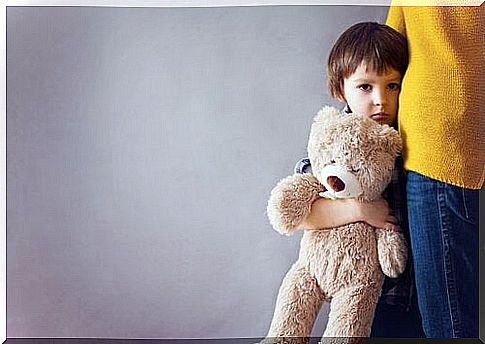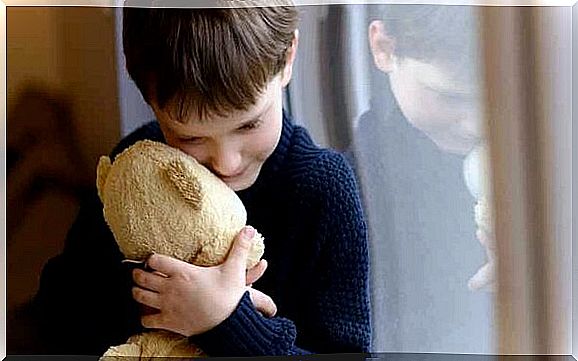Separation Anxiety: When Does It Become A Problem?

Separation anxiety, or separation anxiety, is a situation we usually associate with children, but many adults experience it too. It is defined as feeling excessive fear when we are separated from our home or from people with whom we have strong emotional bonds. People like our parents, grandparents, siblings, children and so on.
The symptoms can be mild or very severe and are similar in both children and adults. In adults, it is usually believed to be a problem that the person developed during childhood. But this is not always the case, it can occur at any time during a person’s life.
It manifests as the fear of being separated from the partner, children, workplace or anything that has a lot of sentimental value. It can be very tiring for the person who suffers from it, but also for the people to whom the person is so attached. Often it reflects or reinforces a dependency that already existed to some extent.
Time is a difficult concept and it takes years to develop a proper sense of time. For many children, any separation is difficult and a cause for sorrow and tears. In addition, if it is not properly controlled by the parents, it can have serious consequences, such as insecurity during adolescence. These consequences can even affect other life stages.
Separation Anxiety: The Importance of Treatment
As with all anxiety disorders, whether we develop them during childhood or adulthood, separation anxiety treatment is extremely important. Only in rare cases does it disappear on its own. Usually it tends to grow, branch out into other areas of life and promote the development of other forms of anxiety. These include agoraphobia or panic disorder.

The recommended treatment is usually psychotherapy. However, when it comes to children, having the right knowledge about the disorder and applying the tools we provide in this article will help you avoid this situation. We’ll help you spot the warning signs in case separation anxiety is just starting.
It’s a normal phase
Certain fear of separation is normal and common during certain stages of development. Between 8 and 14 months of age, babies who previously had no sense of danger begin to fear strangers or new places. This ‘normal phase’ is a natural method of adaptation that helps children adapt to and dominate their environment.
Usually, separation anxiety subsides significantly or completely disappears when children reach the age of about two years. At this age, children understand that their parents may leave, but they will come back later. At the same time, they understand that they too can leave and come back on their own. This new certainty gives them the courage to explore the world.
This does not mean that children cannot experience some degree of anxiety during specific or new moments or situations. This fear is more likely when they are separated from their parents for an extended period of time, when faced with hospitalization, a change of school, and so on.
Separation anxiety often arouses many emotions
In this situation, parents can experience all kinds of emotions. For example, it can cause a feeling of well-being because it is still a nice feeling to know that your child is attached to you. It can also cause feelings of guilt for having to leave them with strangers. It is also normal to feel exhausted or overwhelmed by the amount of attention and time your child needs.
The fact that your child doesn’t want you to leave is a good sign of a healthy attachment. Of course, this only applies as long as this desire does not cause much unrest. A healthy attachment means there is trust. Your child is confident that you will come back when you leave, and this is enough to reassure him while you are gone. A pathological attachment arises when the child needs reaffirmation and security all the time and when he does not have the means to confront new situations. This makes these situations extremely difficult for him.
This is a difficult phase. However, the fear should subside over time and with a lot of patience and strength. If, on the other hand, you run into the room every time your child starts to cry or put aside all your plans for him, chances are he will hone his skills. He will become aware of the power he has to avoid the divorce he fears so much.

Planning ahead and trying it out: two key concepts
If you’re planning to take your child to daycare, you’ll probably face the separation anxiety we’re talking about. Children are particularly sensitive between the ages of 8 months and 1 year. If you have no other choice, try to build it up slowly. Take your child to new places or leave him with a family member or caregiver for a short period of time. Do this more and more until it’s time to leave him at daycare.
Do this ‘exercise’ at times when your child is not tired, restless or hungry. Plan to do it after he has eaten or taken his nap. Remember that he is just a child and it is much better to make changes when basic needs are met.
Prepare yourself and your child for childcare by first checking it out together. In addition, if possible, make the adjustment gradually. For example, leave the little one behind for a few hours at first, and gradually build up this time.
Coherence, tranquility and keeping promises: 3 fundamental guidelines
If you take your child to a particular daycare center, it is because you trust the professionals who work there. In this regard, try to be coherent with this decision. Let them help you manage the divorce by following their advice. Keep in mind that they have a lot of experience with these kinds of issues and want the best for you and your child.
Stay calm and try to convey peace and confidence to your child. Let him know when you’re coming back by using concepts he can understand. For example: ‘after lunch’, ‘after nap’, etc. You can create a farewell ritual that makes saying goodbye a warm, pleasant and loving event. A moment when you give your full attention to him. But once you’ve gone, don’t come back. That can only make things worse.

Don’t disappoint your child
Come back when you promised to come back. In this way, you will nurture the trust your child has in you and help him overcome the situation better. Be punctual, especially during the fitting process. Although children do not have a clear sense of time, they will notice how the other children leave and may feel anxious because you did not come.
When it’s time to say goodbye, don’t leave quickly, even if you see that your child is doing well. This can make him feel abandoned. Only leave after you have said goodbye properly. However, don’t make the farewell longer than necessary. This attitude reinforces the feeling that daycare is a bad place or that what is happening is not fair.
It is not common for separation anxiety to occur every day or last for long periods. If you are concerned that your child will not be able to adapt to your absence, consult an expert. Keep in mind that you can also handle the situation incorrectly. You may need the help of a specialist for this.








